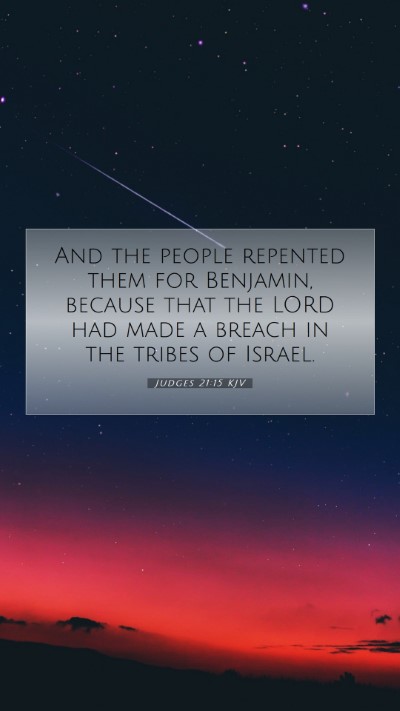Understanding Judges 21:15
Judges 21:15 reads: "And the people grieved for Benjamin, because the LORD had made a breach in the tribes of Israel." This verse occurs in the context of a dire situation faced by the tribe of Benjamin after a civil conflict among the Israelites. Below, we will explore its significance, interpretation, and meaning through insights derived from notable public domain commentaries.
Bible Verse Meanings and Interpretations
In this passage, we see a profound expression of grief within the Israeli community. The grief is attributed to two significant forces:
- The loss experienced by the tribe of Benjamin: The text highlights the sorrow of the other Israelites as they lament the losses endured by their fellow tribe members.
- Divine intervention: The wording “the LORD had made a breach” implies that the events occurred as part of God’s plan and judgment, stressing the seriousness of sin and conflict within the community.
Bible Verse Commentary
Matthew Henry in his Commentary suggests that this grief illustrates the deep bonds that existed among the tribes, despite their recent conflict. It exemplifies a communal sense of loss that reflects on God's judgment and the dire consequences of their actions.
Albert Barnes notes that the term “breach” indicates a significant fracture within the unity of Israelite tribes, reflecting a national crisis. He emphasizes that the lamentation isn't merely for lost lives but for the fabric of their society which was being torn.
Adam Clarke further elaborates on this grief, stating that it reflects not only the physical losses incurred but also the spiritual implications of their collective actions. Clarke posits that the Israelites could have sought peace in other ways instead of resorting to violent measures, providing an important lesson on the consequences of internal strife and unrest.
Scripture Analysis and Biblical Exegesis
This verse serves as a critical pivot in understanding the implications of social cohesion and divine authority. Various interpretations can be drawn:
- It speaks to the communal responsibility of maintaining peace and unity within the body of believers, as the sorrow experienced was collective.
- The acknowledgment of God's sovereignty implies that tragedies, even those stemming from human action, are under His providential control.
- The emotional response of the Israelites signifies the importance of compassion and empathy, reminding us that the implications of conflict extend beyond the immediate parties involved.
Application of Judges 21:15 to Daily Life
When interpreting Judges 21:15 in the context of daily life, several applications can be highlighted:
- Empathy for Others: The verse encourages individuals to empathize with those who face loss and grief, fostering a spirit of community support.
- Unity in Diversity: The sorrow expressed showcases the need for unity among believers, prompting modern readers to build strong communal relationships within churches and communities.
- Heeding Divine Guidance: Recognizing that conflicts often have deeper spiritual roots encourages believers to seek God's guidance in peacemaking efforts.
Related Bible Cross References
- Judges 20:35: Highlights the Divine intervention in the conflict against Benjamin.
- Deuteronomy 19:3: Discusses cities of refuge, indicative of God's mercy amid judgment.
- Romans 12:15: Counsel on mourning with those who mourn, reflecting the call to compassion.
Conclusion
Judges 21:15 is a poignant reminder of the importance of community, the consequences of conflict, and the overarching sovereignty of God within our lives. Through various commentaries, we can gain deep insights into the meaning of this verse, aiding our Bible study groups, online Bible studies, and personal reflections. The verse serves as a significant piece for understanding Scripture, allowing for deeper exploration of the biblical narrative of unity, loss, and divine authority.


